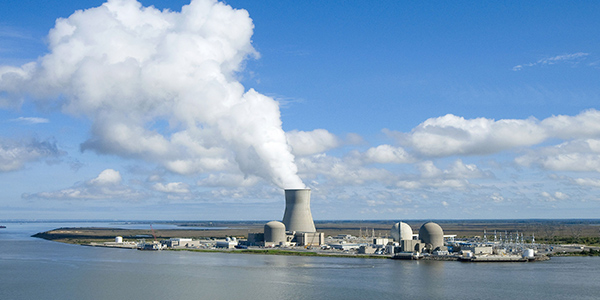A New Jersey Appellate Court on Friday dismissed a lawsuit seeking to block state subsidies for Public Service Enterprise Group’s Salem and Hope Creek nuclear plants, which paid the company $300 million last year.
The court ruled that there was nothing wrong with the process by which the state Board of Public Utilities (BPU) assessed whether Salem 1, Salem 2 and Hope Creek were eligible to take part in the state’s Zero-Emission Certificate (ZEC) program, and concluded that they deserved subsidies (A-3939-18).
The three-judge panel made its 47-page ruling in response to a suit filed by the New Jersey Division of Rate Counsel, which is charged with protecting ratepayers’ interests, to block the BPU’s 2019 subsidy award. The Rate Counsel argued that the award of ZEC’s to the three plants was arbitrary and capricious and that none of the three plants need the ZEC subsidies to remain financially viable.
The suit struck at the heart of New Jersey’s plan for nuclear energy to remain a key element of the state’s power generating system as it seeks to transition to carbon-free energy, much of which is still in the early development stage.
The ZEC program provides subsidies to nuclear power plants at risk of closure so that they can remain open to generate carbon-free power and help the state meet its goal of reducing greenhouse emissions by 80% by 2050. Gov. Phil Murphy has said he wants to the boost the share of energy generated by carbon-free resources to 50% by the end of the decade.
The Ruling and Future Subsidies
The Rate Counsel filed the appeal after the BPU on March 18, 2019, awarded ZEC’s to Hope Creek, which is owned and operated by PSEG and Salem 1 and 2, which PSEG operates and co-owns with Exelon. (See NJ Approves $300M ZECs for Salem, Hope Creek Nukes.) At the time, BPU Board President Joseph Fiordaliso said the plants provided 32% of the state’s energy mix and 90% of its clean energy.
The board rejected a conclusion by its staff evaluation team, which found that all three units would operate profitably through May 2022 and were therefore ineligible for the subsidies. PJM Monitor Sounds Market Power Alarms.)
But the BPU said the evaluation team improperly excluded from its calculations consideration of PSEG’s operational and market risks, as required by the legislation creating the ZEC program.
In its ruling, the court agreed. “The plain language … makes clear that the legislature intended for the board to consider the applicants’ ‘costs and risks’ when determining eligibility. Had the legislature intended for the board to exclude the applicants’ operational and market risks when analyzing financial eligibility … and to instead assess only whether the applicants were `projected to not fully cover [their] costs,’ it would not have included the words ‘and risks’ after ‘costs.’”
The ZEC program awards subsidies worth about $300 million a year to PSEG, and the company is lobbying for an extension of the award. However, PSE&G CEO Ralph Izzo said in February that the subsidy, which works out to $10/MWh, is not enough to make the plants competitive with natural gas and zero-marginal-cost renewables. (See PSEG Presses for Higher Nuke Subsidies.)
The rate counsel said that it was not surprised by the decision but had hoped for “some independent analysis” of the issues in the case.
“Instead, the court simply applied deference to the agency without considering the considerable impact on ratepayers, many of whom are suffering under the current economic crisis,” said Rate Counsel Director Stefanie Brand. She said no decision has yet been made on whether to appeal the ruling.
PSEG welcomed the court’s ruling.
“This decision confirms that the BPU appropriately followed the statute and gives clear guidance on how to apply the existing law to the ZEC case currently before the BPU,” said Marijke Shugrue, a spokeswoman for PSEG. “Nuclear is critical to achieving New Jersey’s clean energy goals for 2050.”
The BPU, which saw Friday’s ruling as an affirmation of the need for the ZEC award, is expected to decide in the coming weeks on whether to extend the ZEC subsidies to PSEG for another three years.
Environmentalists ‘Disappointed’
Jeff Tittel, director of the New Jersey Sierra Club, said the organization was “disappointed” by the court’s ruling because the nuclear subsidies divert funds that could be used for renewable energy projects.
“The Appellate Division sided with nuclear subsidies over the ratepayers,” he said. “We think this decision will mean the people of New Jersey will be paying more for electricity and enriching the utilities at the expense of renewable energy and the environment.”
“This subsidy takes money away from renewable energy and undercuts efforts in achieving clean energy goals,” he said, adding that the state will be paying the subsidies for decades.
The Rate Counsel argued that the power plant operators had not met a requirement of the ZEC program that without a subsidy the state would be in danger of losing the carbon-free generation. Under the requirement, the plants needed to show that they wouldn’t cover the “risks and costs” of operating and would cease to do so in three years, the opinion said. The Rate Counsel argued that the plants had overstated their costs and understated revenues, and none of the plants needed subsidies to be financially viable, the opinion said.
The Rate Counsel also argued that the BPU “ignored its responsibility to ensure that the $0.4-cent/kWh charge mandated in the ZEC Act to fund the ZEC program was just and reasonable,” the opinion said.
The appellate panel, however, concluded that the BPU had compiled an extensive record to show that the plants could close without the subsidy, and concluded that the agency did not have the power to change the $0.4-cent/kWh charge, which was set by the legislature.




